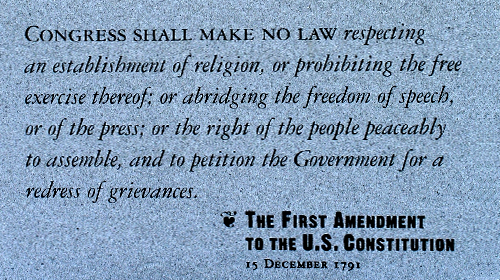
So, this sounds like as good a time as ever to make a counterintuitive argument.
Pamela Geller and Robert Spencer‚ÄĒtwo notable critics of "creeping sharia" and the "Islamization" of America‚ÄĒwere invited to speak at an English Defense League (EDL) rally in Woolwich, the city where a British soldier was brutally murdered in May in what has been described by authorities as a terrorist attack. The EDL is a far-right nativist street protest group, formed out of the soccer "hooligan" subculture in Britain. It is frequently identified as a "hate group."
The British government is surely right to be concerned about at this event. But, using the government's boundless authority to bar people from entering the country if it would run counter to the "public good," the United Kingdom's Home Office .
This is a spectacularly bad idea on both pragmatic and principled grounds.
On the one hand, the travel ban only amplifies Geller and Spencer's anti-Muslim agenda and gives them and the EDL a platform to present themselves as victims of government suppression . If what they're saying is potent and dangerous enough to warrant closing the borders, surely‚ÄĒsome will say‚ÄĒit's worth at least listening to. It also gives Geller, Spencer, and the EDL the ability to cloak their rhetoric in high-minded terms, invoking democracy, liberty, and freedom of speech.
Displaying their media savvy, they did just that. The decision, Geller and Spencer said, was a "striking blow against freedom," and the "nation that gave the world the Magna Carta is dead." Usually it's the liberals that get to say, with justification: "if they're shooting at you, you must be doing something right."
On the other hand, these kinds of travel bans set a terrible precedent for folks at all points on the political spectrum. In the United States ‚Äďwhere unlike Britain there is a First Amendment designed to protect speech and belief ‚ÄďMuslim activists and scholars have been repeatedly denied entry for ideological reasons, and under standards as unbounded as the "public good" rationale provided by the Home Office in the Geller and Spencer case.
In 2004, for instance, the U.S. government denied Tariq Ramadan, a prominent Muslim scholar, a visa based on a law amended by the Patriot Act that allows the exclusion of individuals who, as explained in a State Department training manual, have made "irresponsible expressions of opinion." More recently, a , an , and have all fallen afoul of the government's unfettered authority to exclude or harass visitors to the United States based on ideological disfavor.
The whole Geller-Spencer affair raises another, more "meta," issue. In the nine decades of modern free speech jurisprudence, one primary theme has emerged: the government can't play favorites. That is, the government can't use the law to give an advantage to certain viewpoints over others. This constitutional allergy to content- or viewpoint-based restrictions extends so far that even speech that otherwise receives less constitutional protection‚ÄĒthink obscenity or perjury‚ÄĒcannot be restricted in a viewpoint-based manner. In the famous case , Justice Scalia held that a hate speech code, even if limited to less constitutionally protected "fighting words," is still constitutionally suspect if it only punishes certain "fighting words," and not others.
That central truth of the First Amendment, unfortunately, breaks down when it comes to the government's authority over the borders. Although the government very likely cannot deport or remove lawful immigrants based on First Amendment-protected activity, and likely cannot do so even to unauthorized immigrants, it has a lot more power to block people from coming into the country for any reason‚ÄĒincluding ideological disfavor.
This is as unwise as barring Geller and Spencer from even entering Britain. The analyzing the First Amendment's application to ideological exclusions looked at whether the government's barring an individual (in that case a left-leaning academic) from entering the country did so by looking at the First Amendment right of Americans to access the information conveyed by the visa applicant. But that shouldn't be the primary mode of analysis. The fundamental question should be whether the government should ever have the power to silence a speaker because it dislikes what's being said.
With Geller and Spencer, there's no evidence that imminent violence is likely to ensue from their admittance. If there's a potential for violence during the rally itself, the authorities can and should deploy adequate security to keep that from happening. But, by simply banning them from the country, based exclusively on the offensiveness of their political views, the Home Office has managed to boost the profile of both Geller and Spencer, and certainly of the EDL.
Censorship is often a gift to the censored, which is one of the main reasons behind the ņŌįń√ŇŅ™ĹĪĹŠĻŻ's common refrain: the answer to speech with which you disagree is more speech, not less.
Learn more about censorship and other civil liberties issues: Sign up for breaking news alerts, , and .

